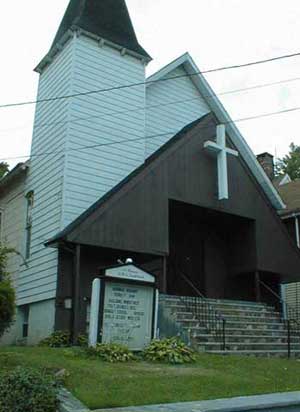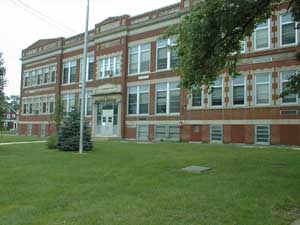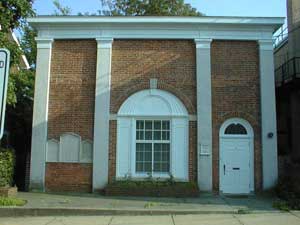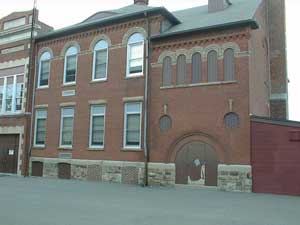Paul Robeson's family moved to Somerville, NJ in 1910 when Paul was 12. Paul's father, the Rev. William D. Robeson, served as pastor of St. Thomas A.M.E. Zion Church from 1910 until his death in 1918 at the age of 73.
Paul attended school in Somerville and graduated from Somerville High School in 1915.
To gain a better understanding of his high school years, read the excerpts below. For a fuller description refer to Paul Robeson's Here I Stand, Prologue: "A Home in that Rock" or Llyod Brown's The Young Paul Robeson, Chapter Five: "High School: The Fledgling Hero". See Bibliography for citation.
Instructions
Read the following excerpts from Paul Robeson's book Here I Stand (Paul Robeson, Here I Stand. Boston: Beacon Press, 1971.) and reflect on the following questions:

"High school in Somerville was not Jim Crow, and there I formed close friendships with a number of white classmates. One of these was Douglas Brown, a brilliant student who was in my class through the four years and who later became dean of Princeton University. I was welcomed as a member of the glee club (unlike later at college) and the dramatics club and into various sports and social activities around the school. The teachers also were friendly and several of them are especially remembered." p.19

"Miss Vosseller, the music teacher who directed our glee club, took special interest in training my voice. Anna Miller, English teacher, paid close attention to my development as a speaker and debater; and it is she who first introduced me to Shakespeare's works. Many years were to pass before the American theatre would permit a Negro to play Othello, but the idea seemed eminently right to Miss Miller and she coached me in the part for a high-school dramatic performance. Nervous and scared, I struggled through the lines on that solemn occasion (mindful of my father's ear for perfect diction and my teacher's patient direction) and no one in the world could have convinced me then that I should ever try acting again." p.19

"Miss Vandeveer, who taught Latin, seemed to have no taint of racial prejudice; and Miss Bragg, instructor in chemistry and physics, made every effort to make me feel welcome and at ease in the school's social life of which she was in charge. Miss Bragg urged me to attend the various parties and dances, and when I did so, it was she who was the first to dance with me. But despite her encouragement, I shied away from most of these social affairs. There was always the feeling that-well, something unpleasant might happen; for the two worlds of white and Negro were nowhere more separate than in social life" p.19

"Well, as a boy in high school I tried my best to 'act right.' I would make the best of my opportunities. I would measure myself only against my own potential and not see myself in competition with anyone else. Certainly I had no idea of challenging the way things were. But courtesy and restraint did not shield me from all hostility: it soon became clear that the high school principal hated me. Dr. Ackerman, who later rose to higher positions in the New Jersey school system, made no effort to hide his bitter feelings. The better I did, the worse his scorn. The cheers of my fellow students as I played fullback on the football team- 'Let Paul carry the ball! Yay-Paul!'- seemed to curdle the very soul of Dr. Ackerman; and when the music teacher made me soloist of the glee club it was against the principal's furious opposition." p. 20
"He never spoke to me except to administer a reprimand; and he seemed constantly to be looking for an excuse to do so. One fault I had was occasionally being late to class in the morning-probably because our house was only a few hundred yards from school! 'Early to bed and early to rise' was always a hard rule for me to keep, and sometimes I misjudged the few minutes needed to get up and get to class. Then, like a watchful hawk, Dr. Ackerman would pounce on me, and his sharp words were meant to make me feel as miserably inferior as he thought a Negro was." pp. 20-21
"When I was seventeen and in my final year at Somerville High, I learned about a competitive examination open to all students in New Jersey; the prize-a four year scholarship to Rutgers College. ...One of the oldest colleges in America (founded in 1766), it was considered rather exclusive; and while one or two Negroes had once been admitted, none had attended Rutgers for many years." p. 24
"... but if I managed to win this scholarship the financial strain on my father's modest income would be eased...there was one big hitch: I should have taken a preliminary test the previous year, covering subjects studied in the first three years of high school. Somehow I had not known about it then, and so I was faced with an examination embracing the entire four-year course, in the same three-hour period during which the other competitors would cover only their senior year's work. Well, I won the scholarship examination-and here was a decisive point in my life. That I would go to Rutgers was the least of it, for I was sure I'd be happier at Lincoln University (where both his brother and father had graduated). pp. 24-25.
Questions for Discussion
- In what activities did Paul Robeson participate while in high school?
- Describe examples of discrimination as well as examples of acceptance in his high school years.
- As you read about Paul Robeson's latter life, in other areas of this site, describe the influence of this time period on his latter life.
- What things in Robeson's high school years would be similar/different to a student of today?
- Is there anything in his high school career that would distinguish him from other students of his day?